
The 15th annual IMMRAMA Festival of Travel Writing in Lismore burst into life last Thursday night with a captivating talk by renowned novelist Colm Tóibín in the Courthouse Theatre.
Despite the rather somber theme of the 2017 edition of IMMRAMA – Emigration, Exile and Slavery – Tóibín kept the audience laughing from start to finish in his own indelible way.
Mr Tóibín, a native of Wexford, is best known for his novels ‘Brooklyn’, ‘The Master’, ‘The Blackwater Lightship’ and ‘Nora Webster’. His latest book, ‘House of Names’, is a retelling of the Greek tragedy ‘Oresteia’.
Over the course of almost two hours, Tóibín spoke about his experiences of democracy taking hold in Spain and Argentina, all the while humourously comparing these dramatic times with the events of the previous day, when outgoing Taoiseach Enda Kenny swapped seats with the incoming leader Leo Varadkar in the Dáil.
Tóibín first arrived in Barcelona, fresh out of college, in 1975, just before the death of dictator Fransisco Franco and the start of the Spanish transition to democracy.

During the 1980s, Tóibín travelled throughout South America, from Brazil to Bolivia and beyond, before arriving in Buenos Aires in Argentina and witnessing the National Commission on the Disappearance of Persons, following the end of the military dictatorship that ruled in the country between 1976 and 1983 and the beginning of the democratic government of Rául Alfonsín.
One of the first anecdotes Tóibín told was the curious tale of the Dublin Maoist who he had met while studying in University College Dublin. Prior to entering UCD, this Maoist had been incarcerated by his own father, who was the director of a mental hospital for the criminally insane in Dublin, for no reason other than the fact he was a Maoist.
Eventually the man was released, following much indignation, including from the Irish Times, at the time. Tóibín met the man for the final time on a train journey to London before catching his student flight to Barcelona.
Despite not knowing the language and having very few definite plans about his trip to Barcelona, Tóibín found work teaching English there and ended up staying for three years. Following the death of Franco in November 1975, King Juan Carlos I facilitated the development of a constitutional monarchy.
Being in Catalonia as this was playing out, Tóibín said he witnessed many societal changes that were taking place there at the time. He also took part in illegal marches in the streets of Barcelona with a friend from Belfast who was ‘an expert on what to do in a march’.
In the spring of 1976 the new king made a trip to Barcelona, where he made a fist of speaking Catalan during his public speeches. Tóibín found this gesture wasn’t much appreciated by the city’s residents.
“It was like poor Leo speaking Irish yesterday, it was Leaving Cert Irish, it wasn’t great. You could just see Enda looking up at him, the Mayo teacher, just going ‘yeah, this is really C [standard]’. The king came with the same intentions.”
The Catalan language, Tóibín said, has become ‘trendy’ in 1976, just as had long hair, smoking ‘dope’ and Bob Dylan LPs. “Spanish was the language of school, of state, of the dictator. Catalan was the summer, Catalan was what you spoke at home, Catalan was freedom, and it became trendy.”
The problem, however, that most people were illiterate in the language, having never formally learned it. As time progressed, Tóibín said it was clear ‘the king meant business’ and the Spanish political reform referendum was held in December 1976.
In the spring of 1977, communism was legalised by Adolfo Suárez, the new Prime Minister, leading to celebrations in Barcelona and the return from exile of many of the country’s former communist leaders and supporters from abroad. Josep Tarradellas returned from France and went on to become the President of the Generalitat of Catalonia. Tóibín recalled that Tarradellas arrived into Barcelona to huge crowds and while his speech was emotional to him, many of the Catalans appeared to be less sentimental.
“I discovered one thing about the Catalans, they’re not sentimental,” Tóibín said. “Some people were against him, he wasn’t left wing enough, or some people thought he was too left wing, I don’t know what he had done to people over the 40 years in exile but not everyone supported him. I was in tears, thinking this is the most beautiful moment, it’s the end of a dictatorship, it’s democracy coming back.”
Tóibín eventually found himself back in Dublin, working as a journalist, then as the editor of Magill, a popular magazine at the time that was owned by Vincent Browne. After some time Tóibín decided to leave the magazine and he made the decision to once again go abroad.
“One day it occurred to me that I should go to Brazil, it occurred to me just like that, walking on the street,” he said. Tóibín arrived in Rio de Janeiro, again with very little idea of what he would do while in South America.
He was robbed of some of his possessions while swimming in the sea beside Copacabana, though the thieves left his press card. After some time travelling throughout the continent Tóibín ended up in Buenos Aires, where he put this press card to use. Rául Alfonsín, the country’s new ruler, had created the National Commission on the Disappearance of Persons to investigate the fate of those affected by forced disappearance and human rights violations during the military dictatorship between 1976 and 1983.
“I saw this in the paper and thought ‘oh my God’, that press card that wasn’t stolen, I’ve got a press card!” Tóibín received accreditation to cover the proceedings, hearing the stories of what occurred in Argentina during those years, as told by survivors. Though the generals who were put on trial never appeared, the Trial of the Juntas collected evidence against those in power during those years.
“This is another aspect in a way, where I was wondering around and South America at the time was recovering from all these dictatorships and difficult politics and great offences against human rights,” he said. “I think I was in too cities where I could see people walking differently, thinking differently, newspapers appeared in a different style because of democracy.”
He added that, while one can laugh at the proceedings that took place in the Dáil the previous day, the peaceful transition of power from one person or one group to another ‘is something we should not take for granted’. Tóibín immediately apologised ‘for saying something so pompous’.
The evening ended with a short Q&A and a presentation by Tom O’Grady from the festival’s committee to Mr Tóibín.











